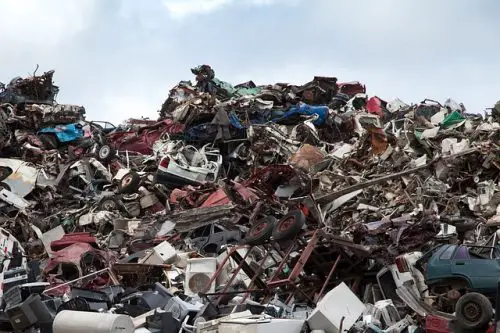
Has your refrigerator gone bad? Has it been damaged beyond repair? Do you need to dispose of your refrigerator without angering Mother Nature and going against numerous environmental laws?
Well, there are three ways to dispose of a refrigerator: recycle it, trade it off for a new one or call a certified junkyard to pick it up.
This article will give you detailed information on how to dispose of your refrigerator with one of these methods. But first…
Table of Contents
Before You Dispose of the Refrigerator; Is it Beyond Repair?
The first sign that your refrigerator has gone bad is if it doesn’t do what it was manufactured for. And that is, to cool. But depending on the diagnostics, you may have to dispose of it and get a new one.
So, before you dispose of a refrigerator, you probably want to be certain that the problem cannot be fixed easily.
If a refrigerator stops cooling, for instance, a number of things could be wrong. Either one or more of the components is faulty and needs to be replaced. Or perhaps, it just needs regular servicing.
A faulty compressor, for example, may cause a refrigerator not to cool properly. A compressor is a component that increases the temperature and pressure of the refrigerant. The refrigerant then cools down and absorbs the heat of the refrigerator. Hence, making it cooler. If the compressor or any other related component, such as the compressor start relay is faulty, then it is better to replace instead of disposing of the entire unit.
Other components that could be faulty in the refrigerating unit are condenser, evaporator, expansion valve and many others. So, it is advised that a technician checks out all the components to ascertain it can’t be fixed.
Sometimes, however, the cost of repairs may outweigh the cost of purchasing a new unit. If that’s the case, then it is advisable to get a new refrigerator. This is to save energy and money too, as experts have noticed that faulty refrigerators tend to consume more energy than usual.
All that being said, if you have come to a definite conclusion that what you need to do to your refrigerator is to dispose of it…..
Then we’ve got you covered in this article.
Let’s get down to how to dispose of a refrigerator.
How To Dispose Of A Refrigerator — The Specifics
A refrigerator consists of various metal parts and other harmful substances such as the refrigerant. And for this reason, you simply can’t take it out with regular trash, also considering the fact that it is quite bulky. This is why disposing of a refrigerator must be done carefully and properly.
Method 1 — Recycling
Recycling is most times the best option when it comes to disposing of bulk metal appliances, which is why we’re going through it first before the other option.
This method, as it may interest you to know, brings in extra cash, as there are certain companies that have the sole interest of purchasing old appliances for them to be recycled. Amazing, right? Let’s get down to how it actually works.
First, you want to let people know you have a fridge you’d like to recycle. So, you need to list your old fridge to be sold.
Online websites such as Facebook Marketplace have made things easier. All you need to do is upload it and indicate all other specifications about the fridge.
By the way, it’s best to keep things 100% and not lie. For instance, clearly state that the fridge may have certain defects if you suspect or know for sure that it actually has some defects. As they say, honesty is key!

Method 2 — Trading it For a New Refrigerator
Another thing you may want to consider is to walk into the manufacturer’s store of your old refrigerator and check if they offer trade-in services.
If it is available, all you need to do is to bring your old fridge and then pay an extra amount of money to get a new unit.
And in the event that you don’t know any store nearby, you could also check their website, and speak to their customer service agents for more information. And voila! You might have yourself a new refrigerator without so much stress.
You see disposing refrigerators isn’t that bad, right?

Check out these other in-depth articles/reviews…
- Bottom Freezer Refrigerators: A Buying Guide
- Kegerators: A Complete Buying Guide
- Chef Base: A Complete Buying Guide
- Commercial Refrigerators: How To Buy The Best
- How To Buy The Best Freezerless Refrigerator
- Under-counter Refrigerators — How To Buy The Best For You
Method 3 – Sending it to a Junk Yard
Still on how to dispose of a refrigerator, another method is taking the old refrigerator to a junkyard.
A junkyard is basically a designated place where scrap metal is collected to be recycled or properly discarded. There are certified junkyards where different types of metal or waste are disposed of properly, without you having to worry about endangering people’s lives.
All you need to do is find one that can properly dispose of your old refrigerator. You could ask if they have arrangements to pick up the fridge, or whether you have to drop it off yourself.
Most times, rather than not, some of these junkyards pay for these scrap metals. So, you could also be making some extra cash too!

How To Dispose Of A Refrigerator — Bottom Line
We’ve covered the fact that you can’t just dump your old refrigerator in the dustbin, which is probably impossible even because it disregards a lot of waste management laws – laws that were put in place primarily to protect the health and safety of the individuals in the society.
So, disposing of your refrigerator has to been done in a safe and proper way. And we mentioned ways to get this done.
You can list your refrigerator on any online website that deals in the recycling of old appliances including Facebook Marketplace, or you could try to trade it for a new one at the manufacturer’s store if that offer is available.
You could also consider taking it to a government certified junkyard. The keyword here is ‘certified’, to ensure that you are complying with the environmental laws of the land.
Want to learn more about refrigerator disposal? You can also check out this post from WikiHow to learn more.
How to Dispose Of a Refrigerator — Related FAQs
How Do I Know When My Refrigerator Needs to Be Disposed Of?
Here are signs that show that you need to dispose of your refrigerator:
- A faulty refrigerator motor. A faulty motor, in most cases, is the reason behind a refrigerator not working. Sometimes, the refrigerator will shut down immediately. Other times, it won’t start at all.
- A faulty compressor. The refrigerator compressor is responsible for the refrigeration cycle. If the compressor stops working, the refrigerator might not work. You can get it repaired, but if the problem persists, then you need to dispose of the refrigerator.
- A damaged thermostat. A faulty thermostat can transmit the wrong signals to a refrigerator capacitor. And just like the compressor, if this problem persists after a number of repairs, you might want to consider disposing of it.
What are the Factors to Consider When Disposing of a Refrigerator?
- Refrigerant. Refrigerators that were made before 1995 usually contain chlorofluorocarbon (CFC) refrigerant. Window air-conditioning units also contain hydrochlorofluorocarbon (HCFC). Both are ozone-depleting substances (ODS). If released into the environment, they can destroy the ozone layer. So, it is important to check with your local authorities before you dispose of a refrigerator.
- Foam. Refrigerators that were made before 2005 are enveloped with foams that contain ozone-depleting substances. This is another factor you need to pay attention to before you dispose of the refrigerator.
How Much Does it Cost to Dispose of a Refrigerator?
The cost of picking up a refrigerator for disposal could vary between $10 and $50.
For instance, the municipal public works department in your area might provide a free collection of the refrigerator. Otherwise, there might be a fee for the collection of the refrigerator. Also, the fee might vary based on the refrigerator type.
Some refrigerator retail stores that offer delivery services for new refrigerators bought from them, may also provide refrigerator collection and disposal services. Usually, these retail stores could charge you up to $50 for this service.
What is the Average Life Expectancy of a Refrigerator?
The lifespan of refrigerators is usually based on the refrigerator type. Nonetheless, if the lifespan of a refrigerator is based on the refrigerator type, it should last for approximately 13 years.
Some refrigerators, like the rare single-door units, usually last for about 20 years. But other refrigerators like the top-freezer refrigerator and side-by-side refrigerators usually last for about 14 -17 years.
One factor that can aid the life expectancy of a refrigerator is proper maintenance, which includes keeping it out of direct sunlight and away from appliances that produce heat like microwaves and dryers.
What is Freon in the Refrigerator?
Freon is the trademarked name for a liquid refrigerant. It is a refrigerant that aids the cooling function of a refrigerator. Freon also needs to be removed before disposing of a refrigerator.
When a refrigerator fails to keep food as cold it’s supposed to, you might think that the Freon is responsible for this. However, lack of Freon is very unlikely because the refrigerator maintains a steady supply unless there’s been a leak in one of its components.
You can also carry out some tests to know if the condition of the refrigerator is due to Freon leakage or something else.
How Do I Dispose of the Freon in My Refrigerator?
Disposal of Freon from a refrigerator should only be done by a certified professional. Do not try to do it yourself.
To dispose of a Freon from a refrigerator:
- Contact your municipal waste handling authority for instructions on where you can dispose of the Freon. This way, you’ll have ideas about the disposal areas around you.
- Hire a certified technician that can do the job. You can do some researches, go on sites, and check out certified technicians, their ratings, and reviews.
- After the technician removes the Freon, ensure that you ask for the proper documentation you need to further dispose of the Freon. The document should include type, amount, and unit information.